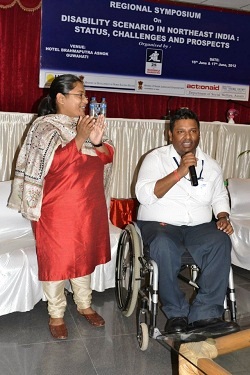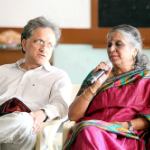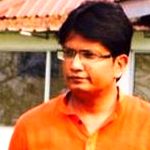Poetry Editor ANANYA S GUHA comments:
Arjun Choudhuri's poems have a sensuous flavour. They are full of light, colour movement , taking one into both the past and present. There is something ' indefinite ' in his poems as they defy time and finitude. History also comes in, as sheer abyss of time and space. Words are precisely and immaculately crafted and the inner rhythms of the poems resonate and reverberate.A conscious crafter of words Arjun deploys his poetic 'strategy' bringing in effectively elements of surprise. He is also unabashedly lyrical.
BARADARI
It is said that brothers cannot die
without killing each other's memories
of each other.
In the valley, where the sea meets
the serpents, the legendary snakes
who walk about on two legs, and
spring through the earth as waters
come silent as Dardic speakers
of lovely words made of bone
and fate, and misshaped gonads
and adventitious dreams of a lake
drunk to the fill with names and games.
Dal. Lotus of the east,
and home of flowers.
Guarded deep by fire
and deep fear, and hurt.
Dal, sleep, now that it all
is made of you and him.
Brother. Arm my death
with a slinking serpent tale.
Between brothers there is
nothing on the lines of gratitude.
Between snakes, there is
nothing on the lines of co-sloughing
skin, and kin, and bone, and earth,
washed into Dal for another birth.
SONG TO THE EARTH
A drop in the veil
the morning there
the road not fair
with the daily dust
and the crust of the end,
the whitening and
the tightening rent
of the lonesome war.
There in the mist
now rises clear
the temple made
of earnest crown.
You wait as a gate
that never dares
to close its petals
for fear of there
being no more roads,
or gentle goads
of you and I,
of lip and eye.
Yet what it is
that makes this true
a gentle land of golden hue,
of darkened night,
and pink sundown?
Perhaps it is the fact that you
are different like the dew of the night
is different from the other dues
that slink into my dreaming sight.
CONFESSION
For you alone, my history,
are the truth that lies
shattered and pretty,
but all-powerful.
All else is fixed
into beauty and not-beauty.
If it is not the utterance
of all has been, then what is
this, my history,
putative thesis of this
and that, some of it
said, most of it
engraved
into a wall.
Something
that does not
speak, at all.
WAIT
The train left ten thousand years ago
when there was no Akbar, no peacock throne even.
All that is now left for me to behold is this,
this deserted platform of an illicit life.
ELDER ASKING
How do we live, thinking
of how we live? How do we live
when we think that we do?
How do we now do thinking?
How do we now live, thinking?
On the breast of all that is ice
surges the probability of water.
AGRAPHONIC
The world is not a bridge anymore, son of Marium.
There's no coming and going here as you saw it.
We walk like balloons, and prick the pick, sick
of all that is kind, and beautiful.
The world is not a bridge anymore, son of Yusuf.
Here we labour beneath the back of the vain.
Like the burst of sun that leaves the leaves
wanting to shed before the coming of autumn.
KHUSRO, IT IS NIGHT...
The day has left me endless;
no sun therefore in sight.
I watch the piling pilgrims grow,
for Khusro, it is night.
A diwan for the night, Khusro,
a diwan for the light.
The day was long, and levelled row,
and Khusro, it is right
when you call the door the endless wait
like mustard grows at annual rate,
when all that pales in churning gait
within Nizamuddin's sight.
Khusro, it is night.
Bridges long have passed the world.
Rivers deep have plunged
into the sea where grows the heart
made of words unfurled.
The days have passed like lightning flickers
in the midst of April storms.
Delhi waits like auburn autumn
draped in dark and brownish norms.
And yet the longing surely grows
in the shade of Auliya's tomb.
Here they breed so many things,
none of which make sense of us,
but the dark descends like the draped dead
in a sheer absence of light.
See, Khusro, it is night!
YOU AND I, THE AFTERNOON
This great afternoon,
and you, and the coming
of your eyes, as the clouds,
as the sudden rain, as the light,
as the swallows' flight
over the mango trees,
and the tinkle of the water
that the women wait
at the curling tap,
I love it all as Pipistrello's bat
would love the dangling tresses
of the somnolent Vlad.
GANDHI BAGH
Here in the dark
the joining roads beat
like wings on the surge
in the rain of summer.
When nests follow the way
of liberated attachment,
when trees send leaves
to their placid end at the roots.
In the dark, here, only poles
of electric wait for the lighting.
While behind them the eleven,
dead now as doors and nails,
masquerade as ghosts, deities
of a May that never had been
weighted for, nor truly seen.
As the yellow glares of the cars
slip into a nothingness of dares
and songs, and blares of horns,
the silent man warm with care
walks that thin line between here
and there, and there the mud
slithers across his feet, his fair
feet which tread the path of not-there.
The silent man, with silent mud,
with silent wares, with silent want,
makes for a goodly flower of night
draped and growing with green light.
Singular fantasies surge in his body.
Another wait begins after one has died.
On the turn when he sees the feet,
he gathers his bait, and makes to slink,
to see if this night it would somehow link.
Every evening at eight this garden
comes to life with a silent guard.
In the day, it is only the sea of dead,
of grass, of stone, of flowery head
that people passing see around here.
Gandhi Bagh, secretive citadel,
of dead Mays and a silent bell.







































